Homemade Lemon Citrus Produce Wash {Natural, Fast, & Easy}
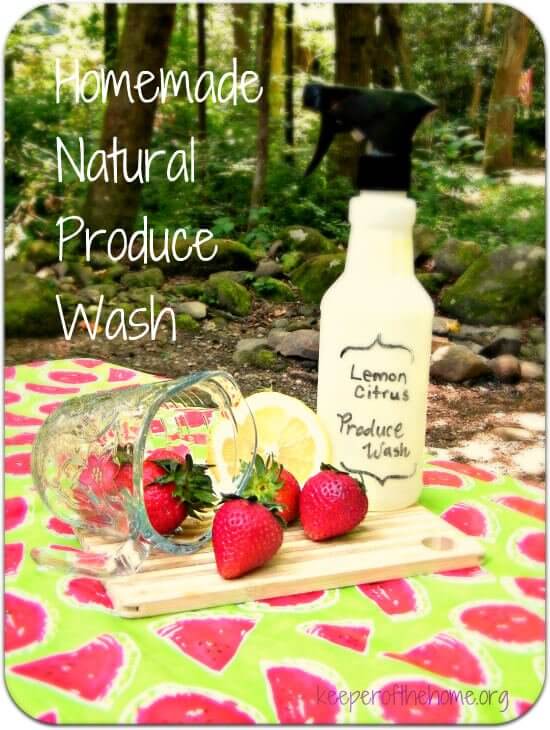
It’s berry picking season and that means strawberry shortcakes, blueberry banana smoothies and berry jams & crisps but if you are like me, you make sure your fruits (and your veggies) get washed before you ever eat or make anything with them.
Did you know that simply rinsing them under water does not get all of the contaminants like pesticides, bacteria or even other toxic chemicals off of your produce? You might as well not even rinsed them. In my opinion, I think produce should be washed in the great debate about washing fruits and veggies. Where do you stand?
The World Health Organization states that “Pesticides are known to cause millions of acute poisoning cases per year, of which at least one million require hospitalization.” One of the simplest ways pesticides and other toxins get into our bodies is through the food we eat, by washing your produce prior to eating them, will help to keep you and your little ones safe.
We have been using fruit and veggie washes for a few years now and the bottles do last quite some time, but making your own is much more frugal, it’s fast, and you can be in charge of the ingredients, so here is a easy, fast and frugal recipe for this homemade natural produce wash.
Note: buying the extract and essential oils can be an investment, however, they last a long time and there are several other uses for them including: Non-Toxic Home Cleaners, Sunburn Soothers, Ear Infections among many others.
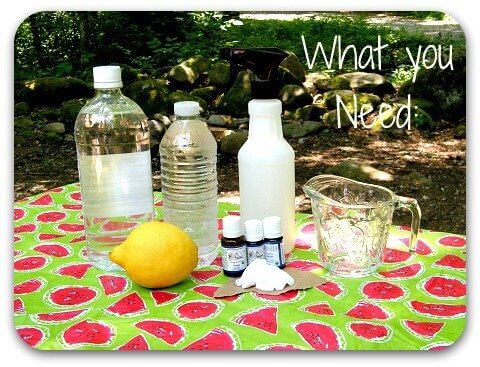
- 8-10 ounces purified water
- 1 cup vinegar
- juice from 1 lemon
- 1-2 Tbsp baking soda
- grapefruit seed extract
- lemon & orange essential oils
- bowl & fork
- recycled spray bottle
Steps to make your own wash:
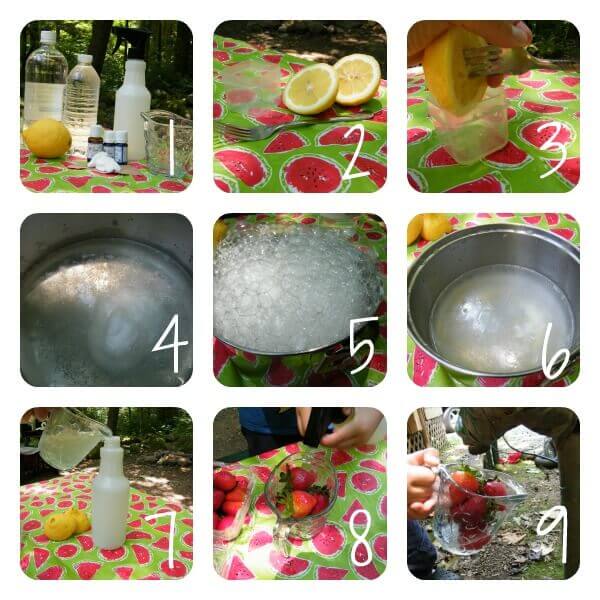
- Gather ingredients & supplies
- Start off by cutting lemon in half and getting your fork ready
- To juice a lemon, simply place fork into one of the lemon halves, sqeeze and twist over a bowl
- Add baking soda, essential oils and extract (about 10 drops of each) to the freshly squeezed lemon juice
- Next, pour in the vinegar which will cause a bubbling effect (your kids will think this is neat!)
- Pour in water, stir until ingredients are dissolved
- Carefully pour mixture into your spray bottle
- Spray on your produce, wait for about 20-30 seconds, if it’s a fruit or veggie that can be gently scrubbed use a scrub-brush specified for produce washing only
- Rinse thoroughly and enjoy your freshly washed & cleaned produce!
Following the EWG’s 2012 list of Dirty Dozen and Clean 15 List is a great way for your budget and to help you to know the produce that you need to buy organically and the produce that is safe to buy conventionally, that just needs to be washed thoroughly.

Click here for this free printable great for your purse.
If you simply do not have time to make your own, please don’t beat yourself up. Veggie Wash is an organic brand that works great! I hope you enjoy this produce wash. Store wash in the refrigerator for 2-3 weeks before having to make another batch, you can also cut recipe in half to make a smaller batch.

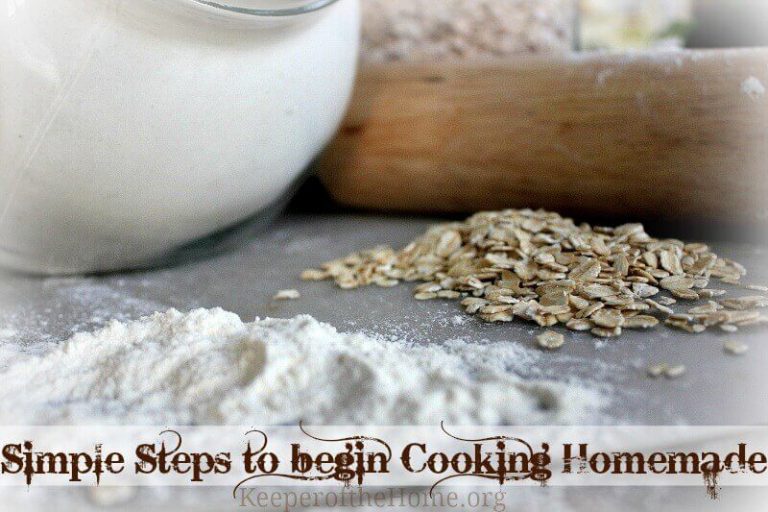

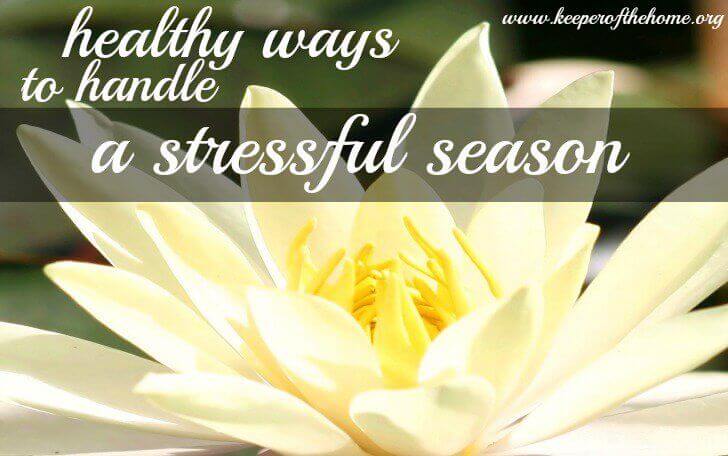
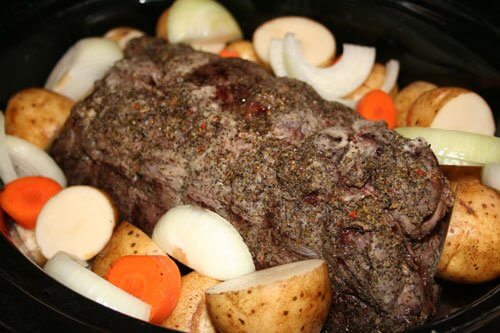

I have been wanting to make a produce rinse for some time. Thanks for the recipe! I was wondering though how much of the grapefruit seed extract and essential oils to add.
Thank you!
I LOVE this, Rachel! This looks like a great recipe to try…and I love that I always keep all these ingredients on hand!
I admit that I haven’t been washing my blueberries lately. We pick them at a local elderly woman’s house, and she doesn’t spray them. If I’m cooking them in something, I’ll wash them, but I have been grabbing handfuls out of the fridge to munch on without washing them. Yikes! But I ALWAYS wash produce from the grocery store!!
I love the pic you made…was that in Pic Monkey? You are so creative! 🙂
Pinning this post for sure! 🙂
Erin, glad you love the wash and can make some! Blueberries are not too much to worry about so you are probably safe! And yes, I used picmonkey, it’s almost better that picnik was!
How much/ many drops of the essential oils do you need to add?
Oops Erica, forgot to add that, went in and editied that. You need about 10 drops of each. Hope you love it!
I use veggie wash but think I’ll try your recipe. I always try to buy produce that’s in season and local. I never buy produce from other countries, especially melons. In Mexico I’ve personally seen crops watered/fertilized with untreated waste water. Since watermelons are mostly, um, water, you can imagine what could be lurking in them.
Actually, the melons don’t absorb bacteria into their pulp. They filter water through the root system so that the interior of the fruit is free of germs. The exterior can be contaminated with bacteria (which is true, too, of organic produce grown locally), so any melons should be washed before cutting to prevent bacteria from the rind being transported by the knife onto the fleshy part that you eat.
I appreciate your recipe. I don’t usually wash my produce with anything but I do rinse it most of the time.
How long does the spray last? And how should it be stored?
Julie, oops, forgot to add that so went in and edited the post, thanks for bringing that to my attention. The wash last about 2-3 weeks in the fridge, you can make smaller batches if that is better for you too, guess it depends on how much produce you are actually washing.
I always rinse off my veggies and fruits before eating/cooking, but I don’t always use special “washes” for them. This sounds very doable. How long does this spray last/is it good for? Or does it need to be made fresh each time I clean anything?
Rhoda, glad you will be able to make use of this wash! The wash is good for about 2-3 weeks in the fridge.
can someone explain why i would put baking soda AND vinegar in a cleaner? when they react and get all fizzy, doesn’t all the cleaning power goodness escape with all the bubbles? (i know that isn’t science speak, please work with me). i always figured vinegar and baking soda would somehow magically lose their potency if they were mixed together to become pH neutral.
Susan, that was my first thought too. When you combine baking soda (sodium bicarbonate) with vinegar (acetic acid), you get water and carbon dioxide (the gas creating all the bubbles). Of course, depending on the ratios of vinegar and baking soda, you also have the “extra” of one of those leftover in the final mixture as well. So, I’m not sure why you’d do that either. Maybe the bubbles are supposed to help, but I can’t think they stick around very long…
But I don’t know how exactly the spray works to remove the pesticides, either, so maybe Rachel can clarify, because I’d be happy to have anything that removed pesticide residue.
Though I’m posting this a little late, so perhaps I’ve missed the “window” 🙂
How much grapefruit seed extract??
10 drops
I thoroughly rinse all my veggies and fruits. I grew up in a home in which my parents grew the majority of our veggies. I watched my mother tirelessly rinse all her produce through three “cycles”. The difference today is, I do not know all the chemicals on my food, where my parents did. I like this wash recipe very much and will mostly likely try it soon. I am very much for doing things the natural way.
Totally, important to wash our fruit and veggies!!! Thank you for the recipe!!
Thanks Rachel! I have gotten pretty darn bad about washing my produce. I go through phases where I fill my sink and soak everything right after the store and then I go through phases, like now, where I just think “I will wash before use” and then who knows how consistent I am! I may be more likely to wash if it is a fun recipe 🙂
Thank you for the easy recipe.
You really should use organic vinegar else you’ll probably end up washing your veggies with GMO corn and pesticides; also, some vinegar is made from petroleum.
I will have to try this! sometimes I’m really good about soaking and/or rinsing, and sometimes not so much.
There’s a great product called Eat Cleaner Fruit and Veggie Wash, which is all natural and it’s already pre-measured and lasts up to a year and a half, although I go through it a lot faster. It’s only $3.99 a bottle at my local Stater Bros and they even have these cool biodegradable wipes so you can take them on the road but you can also find it online. Doesn’t change the way your food tastes or smells like vinegar can. Love this product!!
RE: frozen berries *(from costco/trader joes) mostly organic. The wild frozen blueberries are not organic. Do you wash these or just eat them straight?
Our Trader Joe’s carries organic, wild, frozen blueberries. We have to be careful though, because they do carry a non-organic variety too.
We buy organic produce, almost exclusively, but I still want to wash it well. I use my natural, non-toxic dishwashing soap to wash my produce. Weird, I know, but I figure if I can wash and rinse my dishes with it, then eat off them, I can probably do the same with produce. 🙂
I use a small squirt in a clean sink, then fill it with cold water. I let the produce soak for about 15 minutes, with occasional swishing/rubbing, then rinse in plain water twice. Works for me!
I read a statistic somewhere this year that stated one of the top 5 dirtiest things you will touch today is unwashed produce. Ick! We wash ours using just vinegar in a spray bottle and then rinse.
What about all the water that you’re all using? Can it be re-used as grey water say to water your plants?
Sure Chitra, I don’t see why not! Thanks for stopping by!
Wouldn’t re-using the water defeat the purpose, since you are washing off the bacteria and chemicals, from the produce? Don’t these end up in the water?
sure it can
Hi! Love this, thank you for posting. I think it is imperative to wash your fruits and veggies before consuming! I juice a lot, and have been making wash with each session consisting of a big bowl of filtered water, apple cider vinegar (because I always have this on hand), 25 drops of grapefruit seed extract, and baking soda. I rinse the produce, put in the bowl, swish around and leave to soak 5 minutes, then rinse again and let dry. Do you think this method is sufficient?
Love this recipe. I need this for my green smoothies! Also, I have a new found love for grapefruit seed extract…use it for everything!
I will definitely be trying this! Thank you for the recipe. In looking online to buy the essential oils I came across this study which found that in addition to the citrus oils, bergamot essential oil was effective as well. In fact, in the study here-http://www.ncbi.nlm.nih.gov/pubmed/17105553-it was the most effective of all the oils at killing bacteria.
It is a great idea to wash your produce. Even though we grow our own, use no pesticides, and only plant heritage or heirloom seeds, we still clean our produce before eating. It’s the smart thing to do.
I put the fruit or veggies in a strainer and let the water from the tap run on them .
Although the “clean 15” is regarding pestisides, I would reccomend eating organic corn & mangos as I have read that they are both largely GMO.